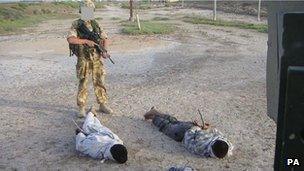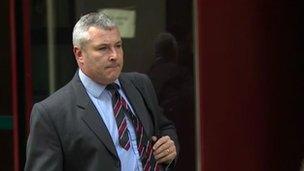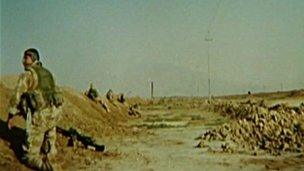Al-Sweady inquiry: Officer denies Iraqi mutilation claim
- Published

The Iraqis were detained by British troops after a fierce battle during the Iraq war
A British officer has dismissed claims UK forces mutilated dead Iraqis after a 2004 battle as "baseless rumours".
Col Adam Griffiths said the rumours were partly caused by insurgents' efforts to discredit coalition forces.
He was appearing before the Al-Sweady inquiry, which is examining claims UK troops mistreated and killed detainees after the "Battle of Danny Boy".
He was the first of up to 200 British military witnesses to appear at the inquiry, which began in 2010.
The inquiry seeks to identify the events surrounding the deaths of more than 20 Iraqi men.
It is concerned with the Battle of Danny Boy - named after a British checkpoint near the town of Majar al-Kabir in southern Iraq in May 2004, during the Iraq war.
Iraqi insurgents ambushed soldiers, leading to a firefight which turned into a three-hour battle, including the use of bayonets.
The allegations centre on whether or not, at the end of the battle, the Iraqis taken from the battlefield were dead or alive.
Lawyers acting for several Iraqi clients claim that some were taken alive and mistreated or unlawfully killed at Camp Abu Naji and Shaibah Logistics Base.
The MoD, British troops and their lawyers vigorously deny the claims, saying those who died were killed on the battlefield.
'Unusual' order
Col Griffiths was the officer commanding B Company, 1st Battalion the Argyll and Sutherland Highlanders, and was leading a "rover group" which was set upon at the start of the clash.
After the battle, he said he had received a "highly unusual" order to pick up the bodies of men who had just been killed.
He did not want his soldiers to pick up the bodies but said the order had been given by the British headquarters in Iraq to try to identify a man thought to be involved in the murder of six UK military policemen the year before.
He said his soldiers returned to camp with about 12 dead bodies in two Land Rovers.
"I did not believe any of our soldiers had mutilated a body and I did not see at the time, and have not seen since, any evidence to support this proposition," he said.

Col Griffiths said he had made "copious notes" about the day's events soon afterwards
"I thought then, and I still think now, that the rumours were baseless and caused by a combination of ignorance amongst the local population as to the traumatic injuries that can be suffered in combat and the misinformation spread by insurgents who wished to discredit the coalition forces."
He said the men's injuries - gunshot wounds, broken bones and limbs at "unnatural angles" - were all consistent with battlefield injuries.
Asked if there was any mistreatment of Iraqis on the battlefield, as alleged, he replied: "No."
Asked if detainees were executed at the camp that night, he replied: "Absolutely not. Categorically not."
Col Griffiths said he had been worried there could be a "witch-hunt" by the Royal Military Police so had made copious notes about the day's events soon afterwards, he added.
'Battlefield injuries'
A second soldier, Sgt James Gadsby - who at the time was a lance corporal - later told the inquiry he helped to unload bodies at Camp Abu Naji.

The claims followed a major gun battle near Majar al-Kabir in southern Iraq
He said there were about 10 bodies in total.
"I could see the bodies and faces of the dead that had been removed from the Land Rovers," he said.
"One of the bodies that was laid out on the ground had his eye shot out and another had half his arm hanging off."
But he said he did not see any injuries "that I believe were inconsistent with having been sustained as a result of the firing of ammunition commonly used on the battlefield".
He said he became aware of the number of Iraqis killed in the battle when he returned to the UK and was told he could buy a T-shirt with the names of the platoons which served on the tour and the number of enemy killed.
The T-shirt said 23 people were recorded as dead during the battle, Sgt Gadsby added.
'Gratuitous violence'
The Al-Sweady inquiry - the second investigation into the claims surrounding Danny Boy - is named after one of the men, 19-year-old Hamid al-Sweady, and is being chaired by retired High Court judge Sir Thayne Forbes at Finlaison House in central London.
It is the second public inquiry into allegations of abuse by British troops in Iraq following one that examined the death in 2003 of Baha Mousa.
The Iraqi hotel worker died while in British custody, and an inquiry found he had suffered an "appalling episode of serious gratuitous violence" at the hands of British forces in Iraq.
Three years passed between the setting up of the Al-Sweady inquiry and its opening as staff, including retired detectives, trawled through as many as 12,000 documents.
The inquiry has cost more than £19m so far and is due to report back by the end of 2014.
- Published18 April 2013
- Published4 March 2013
- Published4 March 2013